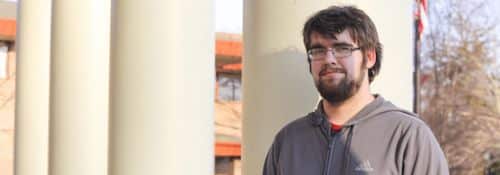
Mathematics and the Liberal Arts: Addison Stumpf
Hillsdale is well known as a bastion of the liberal arts, and with good reason. The college believes English, history, and the rest of the academic disciplines must be taught as a unified whole. Isolating any department would cause it to lose some element of its true greatness.
For those who wish to study the hard sciences, however, Hillsdale can seem a daunting institution. With every student taking classes in the fine arts, history, and upper level English, the sciences can seem underappreciated at Hillsdale. Yet the sciences are not isolated disciplines. They are not held up in Strosacker Science Center, never participating in the larger conversations on campus. Nor are they relegated as quaint trappings of a liberal arts education, hidden away in a far corner of the college.
Addison Stumpf, a junior mathematics major and the president of one of the music honoraries, was drawn to Hillsdale because it has both a strong math department and an excellent music program. “I always wanted to study mathematics, but I wanted to continue playing the piano and singing in a choir. Hillsdale allowed me to pursue all of those interests completely while still being able to study under some of the best English and philosophy professors in the country.”
While Addison thinks that mathematics can easily become a technical discipline and become disconnected from the rest of academia, he points out that this does not happen to students or professors at Hillsdale. “Without the liberal arts it becomes easy to forget the beauty of mathematics: the elegance of proofs and the history and philosophy that created new mathematical discoveries in the first place.”
Those who study mathematics have a uniquely advantageous perspective on the rest of their education. Over the course of his three years studying at Hillsdale, Addison has come to understand that the careful study of logic and the construction of proofs are skills useful in any discipline: “A mathematical habit of mind allows you to approach any subject with a logical structure and discipline which you might not otherwise have. One of the best examples of this is that Abraham Lincoln decided he had to memorize the first five books of Euclid when he studying to be a lawyer. He believed it was necessary to cultivate a logical mind to be a proficient thinker and public speaker.”
For Addison, having mathematicians on campus enriches the entire college. While he recognizes that math is not for everyone, he believes it is important to have people who are capable of understanding the beauty in math. Not having a math department at a college would be like not having sculpture as part of an art program.
Mathematics has always been an integral part of the liberal arts. Three of the seven classical liberal arts were composed of mathematics, and they, along with the sciences should remain an integral part of any complete education. After all, Plato refused to teach philosophy to anyone who was ignorant of geometry.